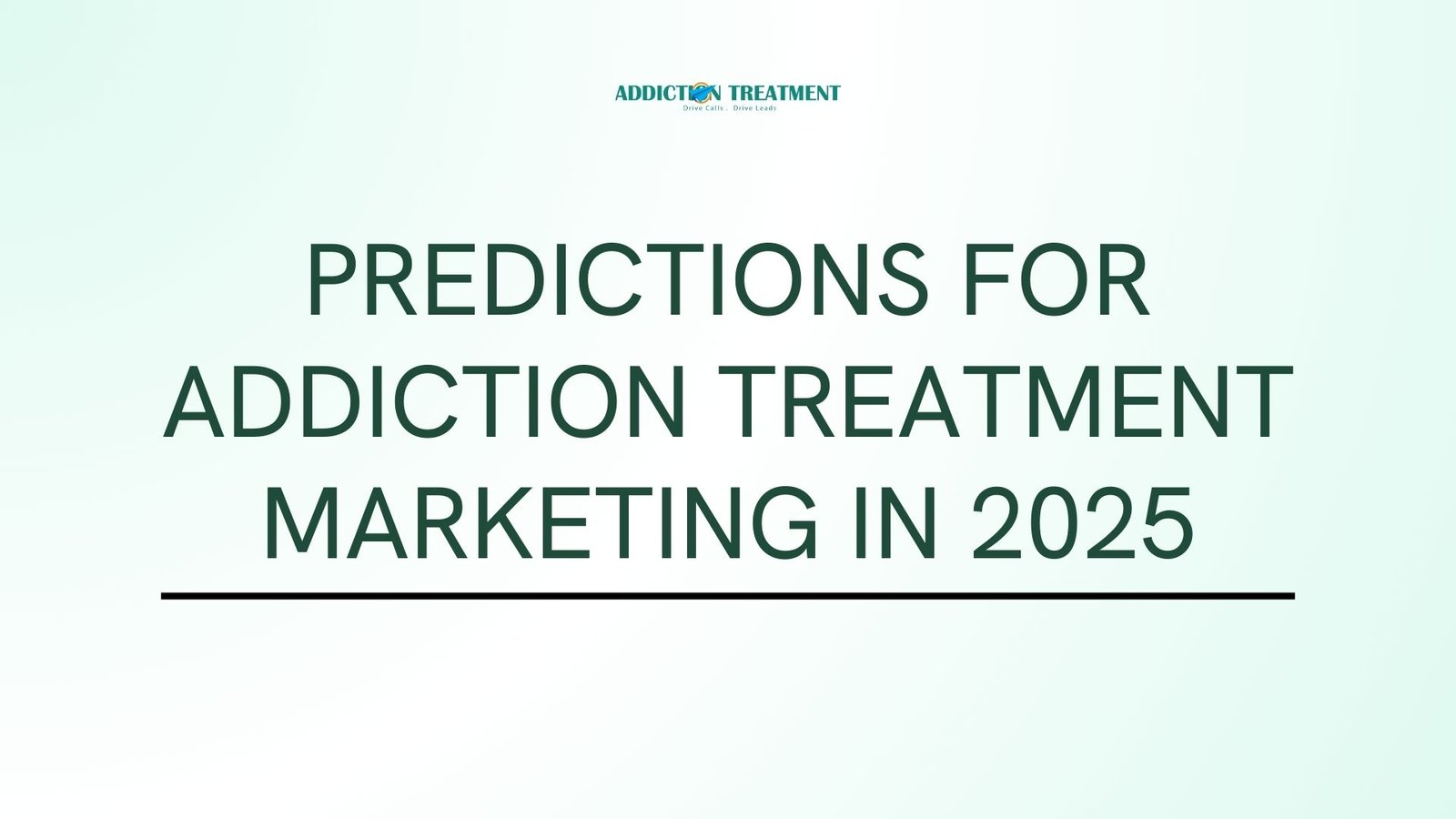The addiction treatment industry is continually evolving, influenced by changes in technology, consumer behavior, and regulations. As we move into 2025, it’s essential for addiction treatment centers to stay ahead of the curve by adapting to emerging trends and leveraging innovative marketing strategies. This article will explore the top predictions for addiction treatment marketing in 2025, helping centers remain competitive and effective in reaching those in need of help.
1. Increased Emphasis on Compliance and Transparency
With stricter advertising regulations from platforms like Google and Facebook, compliance will continue to be a significant focus in 2025. Addiction treatment centers must prioritize transparency in their marketing efforts.
- LegitScript Certification: Centers will need to ensure they meet requirements for LegitScript certification to advertise on Google.
- Content Accuracy: Providing accurate and honest information about treatment programs will not only build trust but also align with advertising platform policies.
- HIPAA Compliance: Data privacy will remain a critical component, and centers must adopt technologies that ensure HIPAA compliance in lead generation and communication.
2. Rise of AI and Machine Learning in Marketing
Artificial Intelligence (AI) will play a transformative role in addiction treatment marketing, enabling more precise targeting and personalized communication.
- Predictive Analytics: AI-driven tools can predict patient needs, helping centers create tailored campaigns that resonate with specific audiences.
- Chatbots: Intelligent chatbots will provide 24/7 support, answering queries and guiding potential clients toward seeking help.
- Enhanced Ad Performance: Machine learning algorithms will optimize ad placements and budgets in real time, ensuring maximum ROI.
3. Focus on Local SEO and Hyper-Targeting
As search engines evolve, local SEO will become even more critical for addiction treatment centers.
- Location-Based Content: Creating city-specific pages with relevant information can improve local search rankings.
- Google My Business Optimization: Maintaining an updated and verified Google My Business profile will help centers appear in local search results.
- Geo-Targeted Advertising: Ads tailored to specific geographic areas can better connect centers with nearby individuals seeking treatment.
4. Content Marketing: Beyond the Basics
In 2025, content marketing will go beyond standard blog posts and newsletters to include immersive and interactive content.
- Video Content: High-quality videos that share success stories, explain treatment processes, or offer educational insights will engage audiences more effectively.
- Interactive Tools: Tools like self-assessment quizzes or cost estimators can encourage website visitors to interact with the content.
- Webinars and Online Workshops: Hosting webinars with addiction specialists will position centers as thought leaders and attract potential clients.
5. Social Media’s Evolving Role
Social media platforms will continue to be vital, but the approach will shift to accommodate changing algorithms and user preferences.
- Private Communities: Private groups on Facebook or forums on other platforms will provide safe spaces for individuals to seek advice and share experiences.
- Short-Form Videos: Platforms like TikTok and Instagram Reels will become valuable for reaching younger audiences with educational content.
- Paid Social Campaigns: With organic reach declining, investing in paid social ads will be crucial for visibility.
6. Expansion of Telehealth Marketing
The pandemic popularized telehealth, and its importance will only grow in 2025.
- Highlighting Convenience: Marketing campaigns can emphasize the convenience and accessibility of virtual consultations.
- Targeting Rural Areas: Telehealth provides an opportunity to reach underserved populations in rural regions where addiction treatment options are limited.
- Collaborating with Health Apps: Partnering with health and wellness apps can introduce telehealth services to new audiences.
7. Data-Driven Decision Making
Data analytics will become the backbone of addiction treatment marketing.
- Performance Metrics: Centers will focus on tracking the effectiveness of their campaigns, including call-to-admission rates and cost per lead.
- Customer Journey Mapping: Understanding how potential clients interact with content across multiple touchpoints will refine marketing strategies.
- Behavioral Insights: Tools that analyze user behavior will help identify patterns and predict future trends.
8. The Human Element in Marketing
Despite technological advancements, the human touch will remain irreplaceable in addiction treatment marketing.
- Authentic Testimonials: Sharing real stories from alumni can create an emotional connection with potential clients.
- Personalized Follow-Ups: A dedicated team for following up with inquiries ensures that individuals feel valued and supported.
- Empathy-Driven Messaging: Marketing content must continue to reflect understanding and compassion for those struggling with addiction.
Conclusion
Addiction treatment marketing in 2025 will be shaped by a combination of technology, compliance, and a focus on human connection. By staying ahead of trends such as AI integration, local SEO, and telehealth marketing, treatment centers can effectively reach their target audience. Adapting to these predictions will not only help centers maintain their competitive edge but also ensure that they provide the best possible support to individuals seeking a path to recovery.


Leave a Reply